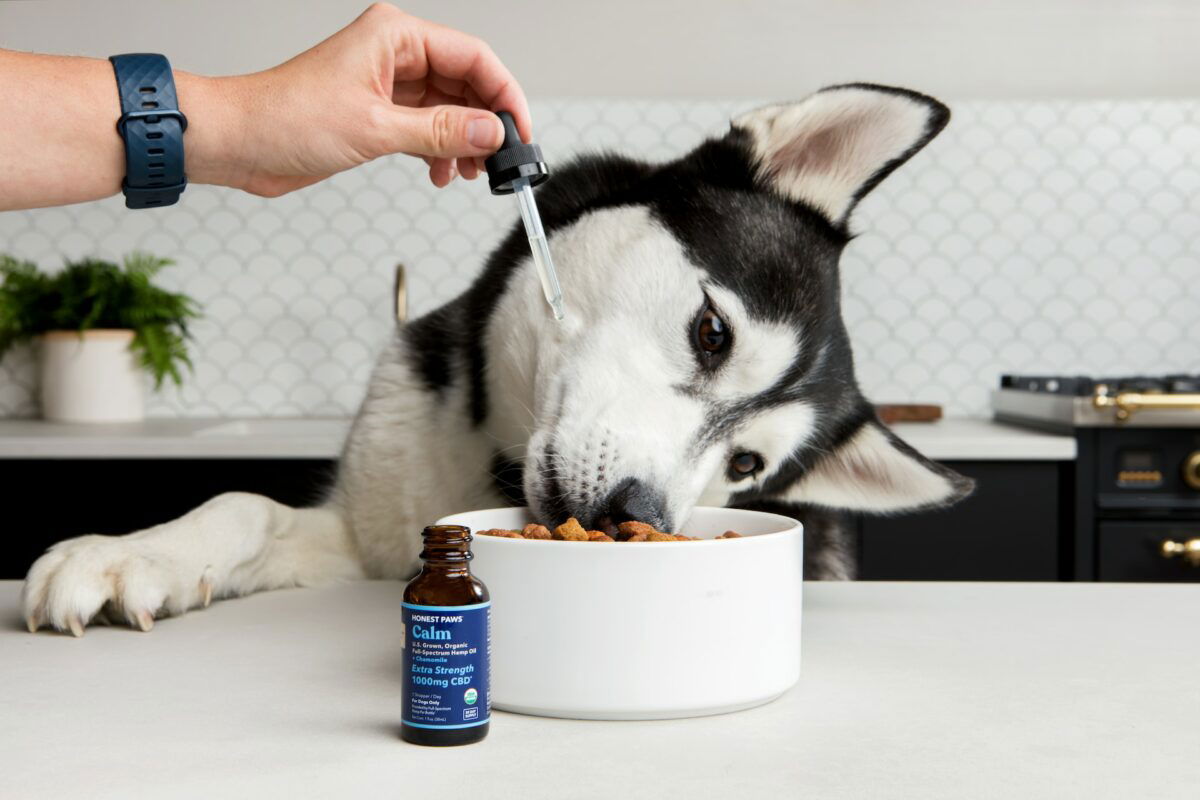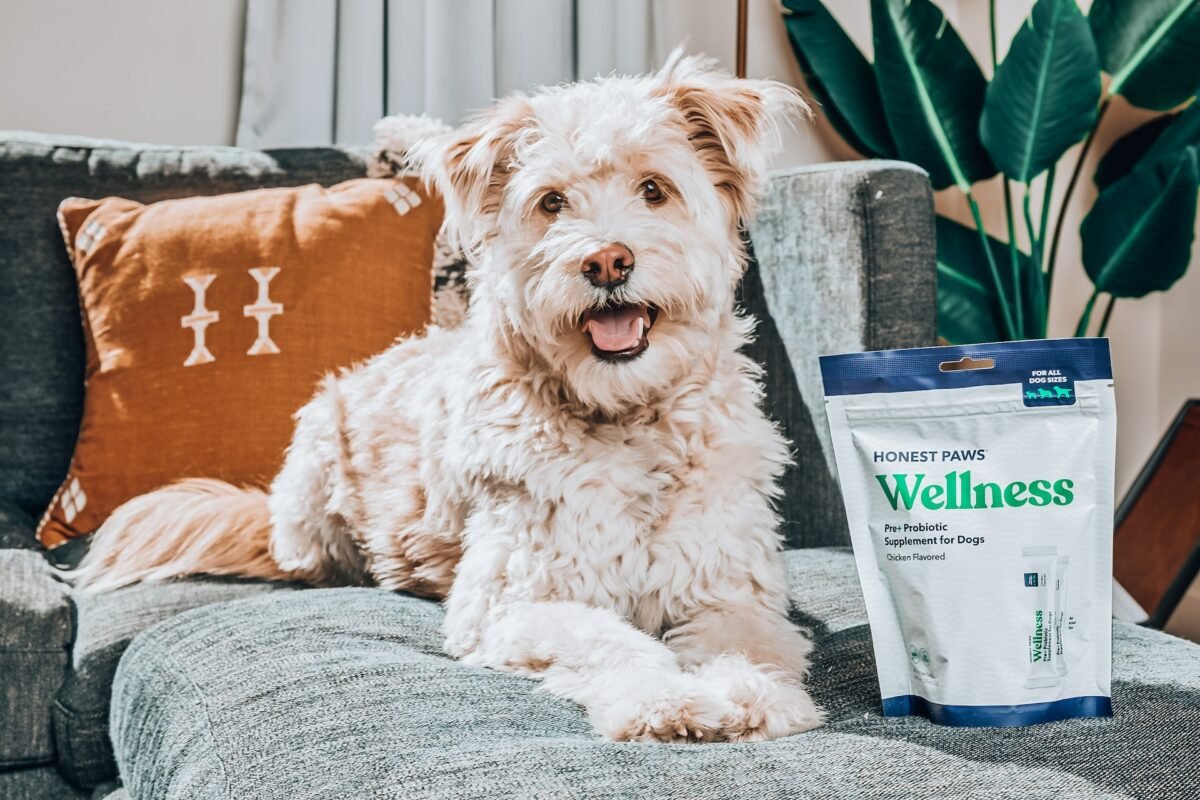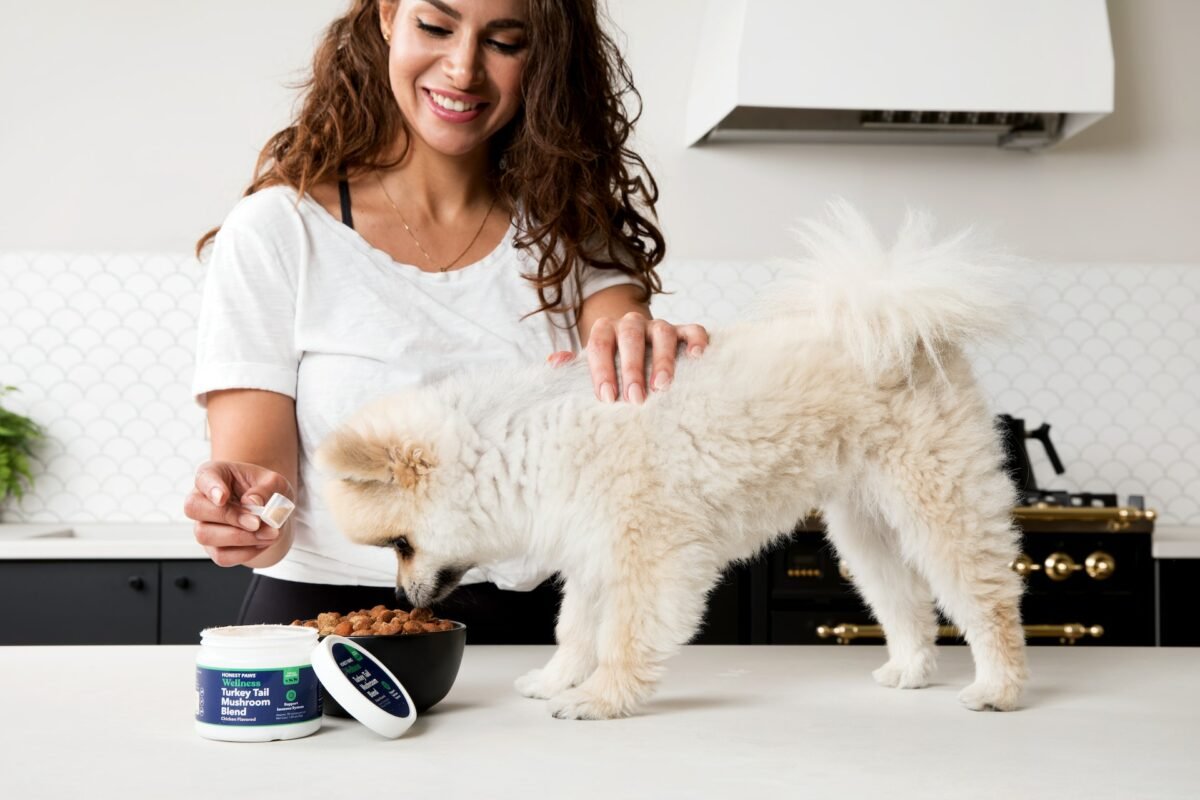We're an affiliate
We hope you love the products we recommend! Just so you know, we may collect a share of sales or other compensation from the links on this page at no additional cost to you. Thank you if you use our links, we really appreciate it!
The overall health of our furry friends should come as a priority to any responsible pet parent and there’s no doubt that good health starts from the gastrointestinal tract.
It forms the base for optimal digestion to support maximum absorption of nutrients. Many vets have mentioned the importance of a balanced canine gut microbiome.
This is where we are introduced to prebiotics and probiotics for dogs – two of the most recommended products for gastrointestinal health.
But what are they, and how do they differ in functions?
Since most people use these terms interchangeably, let’s dive in and explore both prebiotics and probiotics for dogs by looking at their main functions and key differences.
Dog Probiotics
In simple terms, probiotics are the microorganisms living in your dog’s gut sometimes referred to as ‘good’ or ‘friendly’ bacteria.
Dog Probiotics exist as nutritional supplements or natural food such as live yogurt, broccoli, and sweet potatoes, among others are packed with probiotic goodness that can benefit your dog.
These foods and dietary supplements release healthy bacteria to help replenish your dog’s microbiome and balance the intestinal flora.
Dogs can have probiotic foods or supplements in different forms including capsules, pills, powder, treats, yogurt, or kefir.

Dr. Rachel Pilla, DVM stated in a recent study that the combination of a healthy diet and probiotics works by improving the microbial diversity and stabilizing metabolism in dogs.
Probiotics are quantified in Colony Forming Unit (CFU) – which is a unit that shows an estimate of the number of microbial cells in a specific serving.
The following are some of the overall benefits of probiotics for dogs:
- Strengthens the immune system
- Supports proper digestion
- Manages yeast infections
- Combats bad bacteria like salmonella
- Reduces allergies
- Reduces stress and anxiety
- Reduces bad breath (halitosis)
- Minimizes gas and bloating
Beneficial bacteria exist in different types and differ in the amounts of strain they contain. Below are the species-specific strains of the probiotic groups naturally found in the dog’s gut:
- Lactobacillus casei – Treats acute diarrhea
- Enterococcus faecium – Reduces intestinal inflammation
- Bifidobacterium lactis – Prevents constipation
- Bifidobacterium breve – Help with yeast infections
- Bifidobacterium animalis – Helps with acute diarrhea
- Bifidobacterium longum – Reduces anxiety in dogs
- Lactobacillus rhamnosus – Helps with diarrhea
- Lactobacillus acidophilus – Improves the quality of stool and frequency to poop
Dog Prebiotic
Prebiotics are types of carbohydrate compounds that supply food to the billions of good bacteria living in your dog’s gastrointestinal tract.
Prebiotics support the growth of friendly microorganisms and suppress harmful germs that can make your dog ill.
These fiber-rich foods are therefore important in boosting your dog’s immunity and overall digestive health.
The other benefits of prebiotics are linked to their ability to make dogs get fuller and reduce inflammation and irritative bowel syndrome in dogs.
Your furry friend can have prebiotics in supplement form or as appropriate servings of wet or dry foods such as apples, chicory roots, and dandelion greens.
The most common types of prebiotics used in digestive supplements for dogs are Inulin, fructooligosaccharides (FOS), and mannan-oligosaccharides (MOS).
Key Differences Between Probiotics and Prebiotics for Dogs
Probiotics are living microorganisms (bacteria and yeast) that exist in your dog’s gut in their billions while prebiotics are the food upon which the microbes feed.
Picture probiotics as the good ‘foot soldiers’ in your dog’s gut, and prebiotics as their constant ‘food source’.
Here is a table showing the key differences between probiotics and prebiotics for dogs:
| Aspect | Prebiotics | Probiotics |
| Definition | Non-digestible compounds that nourish beneficial gut bacteria. | Live beneficial bacteria that directly add to the gut microbiome. |
| Mechanism of Action | Promote the growth and activity of existing good bacteria. | Introduce live bacteria into the gut to enhance microbial balance. |
| Types | Typically found in certain fibers like inulin, chicory root, and more. | Comprise various bacterial strains, such as Lactobacillus, Bifidobacterium, etc. |
| Benefits | Restore and maintain a balanced gut microbiome, and support immune function. | Restore and maintain a balanced gut microbiome, support immune function. |
| Usage | Generally considered safe for dogs of all ages and conditions. | Best suited for specific situations like after antibiotics or during digestive issues. |
| Storage | Typically stable at room temperature in dry form. | Often require refrigeration to maintain potency. |
| Cost | Generally less expensive than probiotic supplements. | May be more costly due to the live bacteria and specialized strains. |
Now let’s dive into the details.
1. Mechanism of Action (MoA)
Regarding the working principle, probiotics, both supplements and natural foods, are digested and released into the dog’s gastrointestinal tract to repopulate the microbiota with healthy bacteria.
These bacterial microflora work by balancing the condition of the dog’s bowels by adjusting the local pH of the digestive tract.
Prebiotics are not digested in the stomach, but they travel up to the gut, where they are converted into short-chain fatty acids and become a source of nourishment for good bacteria.
2. Specific use cases
Dog probiotics are therefore good at addressing digestive issues by diversifying the microbiota with beneficial bacteria.
They are best taken by recovering dogs to balance the flora that may have been disrupted by the intake of antibiotic medication, or for dogs that have digestive issues.

The following are some of the other factors that can disrupt the balance between good and bad bacteria in your dog’s gut:
- Emotional distress
- Internal parasites
- Introduction of new foods
- Food sensitivities
- Advancement of age
- Internal infections
Prebiotics on the other hand have a long-term role of supplying nutrients to the ‘foot soldiers’ in your dog’s gut to ensure they grow and thrive.
3. Potential side effects
Probiotics are generally safe for dogs and they don’t have lots of side effects especially when prescribed by a qualified vet.
Many dogs can do well with a recommended dose of 1-10 billion CFUs per day, depending on their health and weight.
Some dogs can have gastrointestinal upset, gas, or diarrhea when overusing the wrong strain of probiotic supplements.
Your dog will most likely use up what they need and excrete the excess with additional symptoms such as extra gas or diarrhea, but nothing more than that.
Vomiting or showing decreased interest in food are common symptoms or excessive use of prebiotics in dogs.
An intake of too much prebiotic fiber has been linked with weight loss in dogs, in addition to other gastrointestinal woes such as bloating, flatulence, and diarrhea.
Do Dogs Need Both Probiotics and Prebiotics?
Dogs need both probiotics and prebiotics as part of their healthy diet. The good news is that high-quality probiotic supplements for dogs are also infused with corresponding prebiotics.
Make sure your preferred supplement has clear labels that indicate the expiry date, the exact bacteria species, CFU, and the guaranteed number of living microorganisms.
The manufacturer should also provide supporting evidence that shows the efficacy of the products. In most cases, this is a scientific study done by an external researcher.
The powerful combination between probiotics and prebiotics is known as synbiotics.
Research led by Jirayu Tanprasertsuk found that synbiotic supplementation positively impacted the intestinal microbiota in some dogs.
Naturally occurring foods with high fiber content can also serve as prebiotics to provide the friendly microbiome with nourishment to grow and reproduce.
If your furry friend doesn’t like eating store-bought nutritive supplements, you can try homemade probiotics for dogs to ensure their gut is enriched with good microflora.
Frequently Asked Questions (FAQs)
1. Are There Any Risks Associated with Probiotics or Prebiotics for Dogs?
Dog probiotics and prebiotics are generally considered safe and carry minimal risks that can affect your dog’s health.
Some dogs can show negative reactions such as excess gas, diarrhea, or vomiting when trying a new stain of probiotics, but it should be nothing more.
2. How Long Does It Take to See Results from Probiotics or Prebiotics?
Results will depend on the individual dog. But for the most part, you can expect changes in your dog’s tummy situation and toileting issues within a few days of taking synbiotics.
Research done in 2020 by Mariana P. Perini and her colleagues concluded that most dogs show improved diet-induced immunity within 60 days of taking prebiotics.
Dogs suffering from severe gastrointestinal issues may need a regular intake of pre and probiotics for a few more weeks before experiencing improvements.
3. Can I Use Probiotics or Prebiotics as a Preventative Measure for My Healthy Dog?
There’s no harm in giving your dog prebiotics and probiotics as a preventive measure against potential intestinal issues.
If you anticipate an event that might be stressful for your dog, you can start giving them probiotics a few days before to balance their gut in advance.
Your vet may recommend putting your dog on specific types of probiotics every day for long-term health care.
4. Can I Give Probiotics or Prebiotics to Puppies and Senior Dogs?
Yes, puppies and senior canines can also benefit from the pre and probiotic goodies, but remember to consult your vet before starting them on any supplement.
Your veterinarian will work out the dietary needs of your puppy or senior dog and recommend the microflora strains that might be beneficial to them.

Prebiotics vs Probiotics for Dogs – To Wrap up
Probiotics are those friendly bacteria (and yeast) that help restore the intestinal microbiome in your dog for optimum digestive functions.
Prebiotics, on the other hand, refers to the non-digestible fiber that nourishes the good bacterial flora to help them grow and overpower bad bacteria.
Dogs need both prebiotics and probiotics as a powerful combination for restoring their microbial diversity, strengthening immunity, and improving overall health.
Not every probiotic supplement is made equal. We strongly recommend you consult a vet nutritionist about your dog’s needs to get the best from specific strains of probiotics.
More research is needed to shed light on the specific strains of probiotics that can help different dog breeds with maximum efficiency.
Laura is the founder of Furs'n'Paws. She is a also a pet writer and expert with more than 20 years of experience of working with dogs and cats. She developed a very strong love for animals at a young age. Her passion led her to establish a thriving pet sitting and dog walking business in Dubai. As an expert in pet training, behavior, and nutrition, Laura is committed to helping pet owners and pet lovers by offering high-quality information on a wide range of topics.



No responses yet